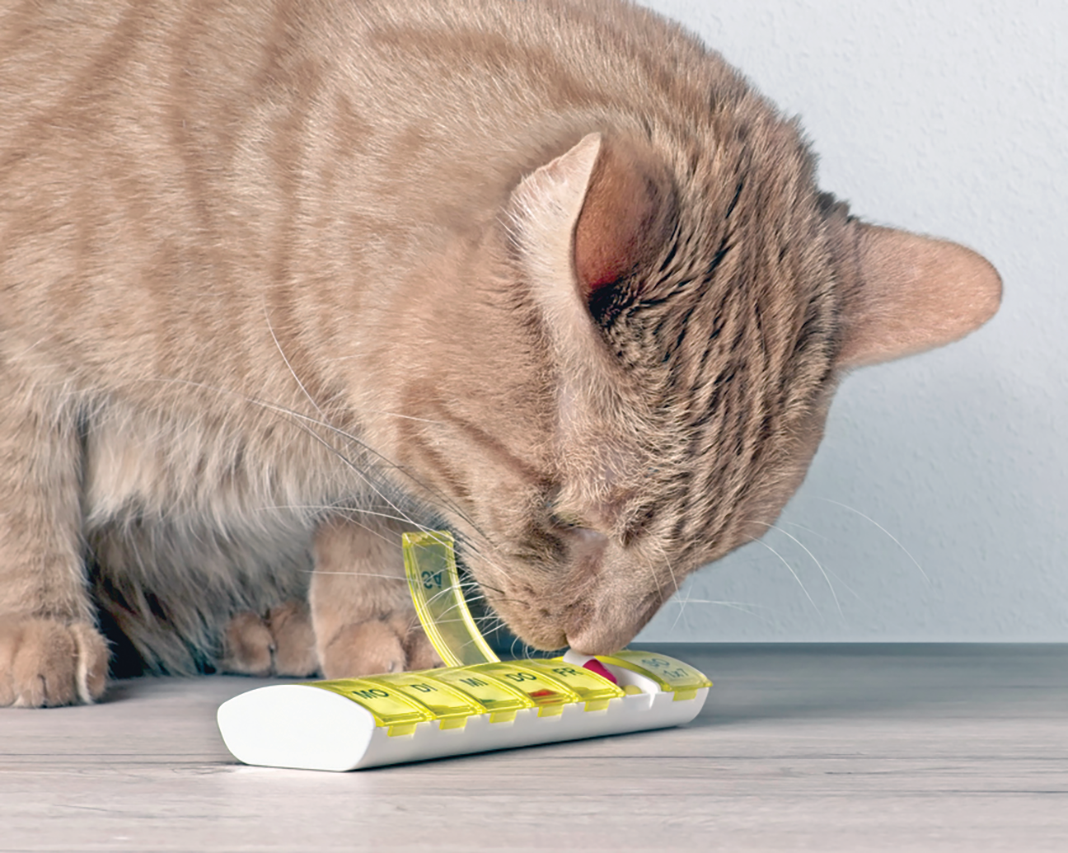It’s a rare household that doesn’t have medicines on hand for different family members and that can result in inadvertent mistakes. For this reason, we share five tips to help keep everyone safe and medications at their peak effectiveness.
Firstly, it’s important that you give the entire course of medications as directed by your veterinarian, even if your cat begins to improve before the course is finished, unless instructed to stop them once symptoms have subsided.
- Storage. Never leave medicine out on the counter, a desk, or even on top of a chest of drawers. Store the medication inside the desk, a cabinet, or a dresser drawer. Medications commonly need to be stored in a secure, dry spot out of the sunlight and away from heat and humidity. The bathroom cabinet may be dark and secure, but it’s in a humid location. The cabinet above the stove may not be the best spot either, as it can get warm, but another kitchen cabinet not directly over the stove may work. A top cabinet is preferable to a bottom cabinet, if possible.
- Safety for all. Ask your veterinarian or veterinary pharmacist about any precautions that should be taken with the medicine, particularly in multiple-pet households. For example, some topical flea and tick medications—and even some shampoos—are toxic to cats.
- Childproof does not equal pet-proof. These required child-proof containers may slow a determined pet down, but we all know that a determined cat is probably not going to be foiled. If you suspect your cat has been into its own medication, or yours, or the dog’s or anyone else’s, try to reach your veterinarian. If you cannot, immediately call a poison-control line, such as the pet poison hotline at 800-213-6680. They may charge for their services, but it is money well spent.
- Don’t split it. Buying a larger-dose drug and cutting it into cat-sized doses is rarely the best choice. Sometimes, there is no other choice. But if your cat is receiving a medication that needs to be split, at least ask if there’s a smaller dose product available. Splitting the pills often means under-dosing or over-dosing your cat.
- Finicky cats and compounding. Sometimes, especially for a long-term medication your cat is not too excited about it, a compounding pharmacy can add meat or fish flavoring to make the drug more palatable without harming its potency. Some medications that are usually given orally may be able to be made by a compounding pharmacist into a topical form that can be applied to the cat’s ear. And, if using a liquid medication, ask your veterinarian or pharmacist about special syringe stoppers that fit on top of bottles of liquid medicine. These enable you to turn the bottle upside down and draw out the right dose into the syringe without spilling.
You Should Know the Do’s and Don’ts
Mistakes in handling medicines are all too common, and people, pets, and the environment can be harmed because of it:
X Don’t flush drugs down the toilet because they can impact the local water supply or leach out where they may be consumed by a wild animal.
X Don’t save expired medication for “the next time.” If your cat is sick, you want something you know will work. While some drugs may be effective past the expiration date, you really don’t know for sure or for how long. It’s not worth the risk.
X Don’t dump loose pills in your garbage, your compost pile, your yard or anywhere else.
√ Do crush unused pills, mix them with kitty litter, and place the mixture in a sealed bag and into the trash.
√ Do take advantage of community and pharmacy take-back programs.
√ Do follow local laws on disposing of needles and syringes. Often, the recommendation is to place them in a sealed container, preferably using a sharps container (small ones are not expensive), and take them to a medical recycling center. The FDA suggests calling “Safe Needles Disposal” at 800-643-1643 or email info@safeneedledisposal.org for information about laws specific to your area.




